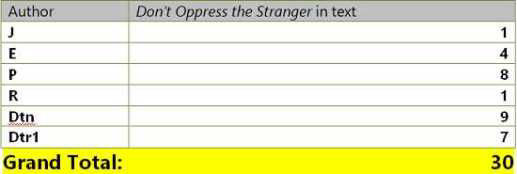“Do Not oppress a stranger. You should know the soul (feelings) of the stranger,
for you were strangers in the land of Egypt” (Exodus/Shmot, 23:9)
Most people are familiar with this expression and how it informs our view on immigration, treatment of foreigners, of people who are unlike us in one way or another.
What you may not know is that this expression, in one phrasing or another, is repeated many, many times in the Torah. How many? Well, it depends on how you count, some researchers have found more than 40 occurrences, others in the mid-30s and in my own investigation I found 30. Does it matter what the exact number is? In my opinion the answer is No. What matters is that there is no other sentiment that even comes close to this many mentions in the Torah. The conclusion drawn by scholars is that this may be seen as the CENTRAL TENET in Judaism.
Of course, as everything else, this may be a matter of opinion.
I wanted to take it one step further and see who wrote these statements that – unfortunately – has very, very strong contemporary relevance!
Many people are familiar with the authors J, E, P and D and although there are others, for the sake of simplicity, let’s limit it to these 4. Now, did all of these authors state the need of not oppressing the stranger? The answer is actually Yes. But do they emphasize this important Mitzvah (Mitzvah in a broad sense) equally?
I thought it would be interesting to find out. So, using the Sefaria for translation of quotes and Richard Elliott Friedman for designation of who wrote what, here are my results.
In a separate document, the quotes and the breakdown are shown
There are two surprising findings:
The low number for J, and the high number for P. All told, the dominating book in this respect is Deuteronomy (Devarim)
So, what can we learn from this?
The centrality of this concept has been discussed in previous articles. What follows are a few references – if you are interested you can read more about this: If you think some of these are repetitive, just think about what’s happening in America today.
-- Can we REALLY say this “too many times?”
 An explanation of the table above can be found here
An explanation of the table above can be found here
Comments made in 2017:
A saying that is central to Judaism reads “You shall not oppress a stranger, for you know the feelings of the stranger, having yourselves been strangers in the land of Egypt” (Exodus 23:9).
If this reminds you about another quote – just a few verses prior to this one that reads “You shall not wrong a stranger or oppress him, for you were strangers in the land of Egypt(Exodus 22:20), it is not a coincidence. The Torah makes this statement, with varying words, not twice but more than 40 (!) times[7].
Clearly this is central to Judaism, and the message is how we should treat minorities and other groups since we know what it is like to be a slave in Egypt[8]
This is the text foundation for our commitment to Tikkun Olam, ‘repairing the world’. Leaders of many Civil Rights, Environmental, Justice and peace organizations are Jewish with a ‘built-in’ sense of right and wrong.
Read the Full article here.
Comments made in 2018:
"Only" about 40 times in the Torah is this theme repeated. Do not oppress strangers because you once were a stranger in the land of Egypt. If you repeat something 40 times, it's gotta be pretty important.
Read the Full Article here
"DJT" that is mentioned in the title refers to the then 'resident of the Oval Office' - DJT
Comments made in 2019:
What is the central tenet in Judaism? We’ve all heard: “You shall not oppress a stranger, for you know the feelings of the stranger, having yourselves been strangers in the land of Egypt” (Exodus 23:9). If this reminds you about another quote – just a few verses prior to this one that reads “You shall not wrong a stranger or oppress him, for you were strangers in the land of Egypt (Exodus 22:20), it’s not a coincidence. The Torah makes this statement, with varying words, not twice but more than 40 (!) times. Clearly, this is central to Judaism, and the message is how we should treat minorities, and other groups since we know what it is like to be a slave in Egypt.
Read the Full article here.
Translations based on Richard Elliott Friedman:
“The Bible with Sources Revealed”
Home
by Richard Gavatin


